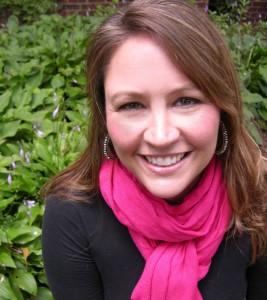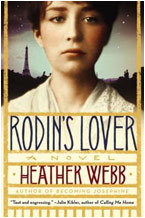HOW TO PITCH LIKE A ROCKSTAR CONTEST: Michelle Brower will be selecting the winners next week. Check in here at Between the Sheets for the winners post. (You may also subscribe—in the right hand bar—to save you some trouble)
AND NOW FOR THE INTERVIEW!
I’m very pleased to welcome author Dana Gynther to the blog today. Her debut novel CROSSING ON THE PARIS tells the story of three women aboard an oceanliner searching for meaning after the Great War. I had the fortune of reading an advanced copy of this absorbing book and I loved it!
Book Blurb
Set on an ocean liner in 1921, “Crossing on the Paris” explores the lives of three women on board. Vera Sinclair, an elderly woman travelling in first class, is reluctantly moving back to New York after thirty wonderful years in Paris. In second class, Constance Stone, a provincial wife and mother, is returning home after a failed attempt to bring her bohemian sister back to Worcester. Below decks, Julie Vernet embarks on her first job in the steerage service crew. During the course of the voyage, classes blur, romances blossom and lives change.
Your novel has a Downton Abbey feel to it–the separation of classes and their inter-relationships. Talk to us about those relationships. How are your characters affected by their confinement to a vessel?
When reading about transatlantic steamers, the class system on board was always the thing that struck me the most. Unlike a modern cruise ship, ocean liners were the only form of transportation back then and accommodations were available for every purse. If I had set this story earlier, say in 1890 or 1910, the class differences would have been even more remarkable. At that time, steerage was truly awful. Men and women were separated into same-sex compartments (leaving the women defenseless against any crew members or first-class gents who wanted to misuse them), and were provided with sewage buckets and poor-quality food. Those conditions could have set the stage for a great novel—but I was interested in the aftermath of World War I.
As is, at a time of reasonable third-class conditions, the difference between the classes is still tangible; they did not mix. I wanted to take this a step further and made one of my main characters a part of the service crew. With Julie Vernet, we get an insider’s look into what it would be like to work on such a ship, to wait on different passengers. The climax in “Crossing on the Paris,” in fact, is when our three main characters—separated by age, character, background, and class (which, on board, is a physical separation as well)—come together. This unlikely event changes them all.
Being confined to a relatively small space—an ocean liner is an enormous boat, but a boat nonetheless—for almost a week does open a door to many possibilities. While doing research, I found that most people who made crossings back then claimed that time passed differently on board, that days felt like weeks. In this short time span, it was not uncommon for life-long friendships to form, for deep, dark secrets to be revealed to other travelers, for near-strangers to get engaged. In this book, all three women are travelling alone; reaching out to others is part of our very human willingness—or desire—to make friends, to share, to feel connected.
Were there any tidbits of research you found fascinating that just didn’t quite fit in the context of the novel that you’d like to share?
Great question! (I can tell you also write historical fiction!!) I had two historical characters—fascinating real people from the times—in the novel up until the last few drafts, when my editor finally convinced me that less is more. The first was Madame Restell (1812-1878), a famous abortionist in New York City, who became both rich and notorious, performing her (sanitary) abortions out of her Fifth Avenue brownstone. The other was Dr. William Halsted (1852-1922), a brilliant American surgeon. A pioneer in his field, the first radical mastectomy was one of his many accomplishments. (He also experimented with the use of cocaine as an anesthetic—and unfortunately became addicted to it.) In the beginning of the novel, Vera tells Dr. Chabron that she hopes an old friend, a surgeon, will be able to help with her breast cancer. That is all that remains of the character Dr. Halsted.
This Christmas, I’m going to post various “cut scenes” on my website, and Vera’s journal entry about Madame Restell will be among them. It’s a great story which reveals a lot about her and how that event shaped her personality. I agree with my editor that it was bulky and ill-placed in the novel, but I hope people who enjoy “Crossing on the Paris” will check it out!
Tell us a little about your publishing process. Did you ever have a time when you wanted to throw in the towel?
My story is a little out of the ordinary. It all began very well—after sending out only 15 queries, I found an interested agent (a MUCH better track record than with my first novel, which is still on the back burner), Michelle Brower. She liked the setting and the characters and gave me some suggestions on how I could improve my storyline. We worked together for eight or nine months and then, when she deemed it ready, she put the manuscript up for auction. I was absolutely thrilled when two major publishing houses made offers. We decided to go with the one that promised to print the book in hardcover and it was to come out the following year. Champagne was popped and my success announced to family, friends and Facebook.
My young, enthusiastic editor had some great ideas for improvements; she did an extensive line-edit on the text—a luxury for debut authors—then I began rewrites. I wasn’t happy with all of her ideas for the novel, but I was sure that we’d be able to compromise.
One day, about a month later, I wrote her a little email checking in and received an auto-reply: “So and so is no longer with us. For further assistance…” My blood ran cold. I quickly wrote Michelle, who looked into it and found that, indeed, this wonderful editor had been laid off due to “office restructuring.” However, things went ahead: I was assigned another editor, received my contract advance, and finished my rewrites. But, when the new editor finally read my manuscript, she wasn’t interested and decided to “let it go.” Ahhhhhhhhh!!!!!!
In the meantime, that wonderful young editor had become a senior editor at a different publishing house. She tried to bring me over (week-one of her new job!), but they declined. So, Michelle phoned the other publishing company from the auction—Gallery, of Simon & Schuster—and spoke with the editor Kathy Sagan. Was she still interested? She WAS. In fact, she said that, even though she reads dozens of manuscripts a week, that one stayed with her. She’d found herself wondering about it: When would it come out? Would it do well? Kathy and I discussed the book at length. She told me that, although she’d loved the original version (that is, the version PRIOR to the months of rewrites), she trusted my judgment. In the end, the final version was the exact text I wanted, using the original editor’s insightful comments, and enjoying my final editor’s support and freedom. My book had found a home. And not just a you’ll-do, “consolation prize” sort of home. An awesome home.
Do you have any advice for debut authors?
To write what you love. This is your world, your opportunity to talk about what interests you, to create scenarios that fascinate you, to go back in time, to go to the future, to invent people that will become real in other people’s imaginations… It’s amazing! That said, welcome all ideas for improvement—your baby will not suffer from a trip to the doctor’s.
Speed Round
FAVORITE DISH: My husband’s “arroz al horno”.
SECRET TALENT: I’ve been known to carry a tune.
BEST PLACE ON EARTH: the Mediterranean
 AUTHOR BIO
AUTHOR BIO
Dana Gynther was raised in St Louis and Auburn, Alabama. After college, she lived in France for eighteen months, then returned to the University of Alabama to get an MA in French Literature. In 1994, she and her French-speaking Spanish husband moved to his hometown, Valencia (Spain), where they work as teachers and translators. She enjoys travelling, reading and writing, making collages, riding her bike around town, but mostly, spending time with her husband and their two daughters.
2 Comments
Join the conversation and post a comment.















A story with twists, turns and a happy ending. And the book sounds great too! Thanks for this interview of Dana.
What a fantastic premise for a novel! I’m heading off to Amazon to buy this immediately. It sounds absolutely wonderful!
Thank you to Heather for introducing me to Dana, and thank you to Dana for writing such a great-sounding book!